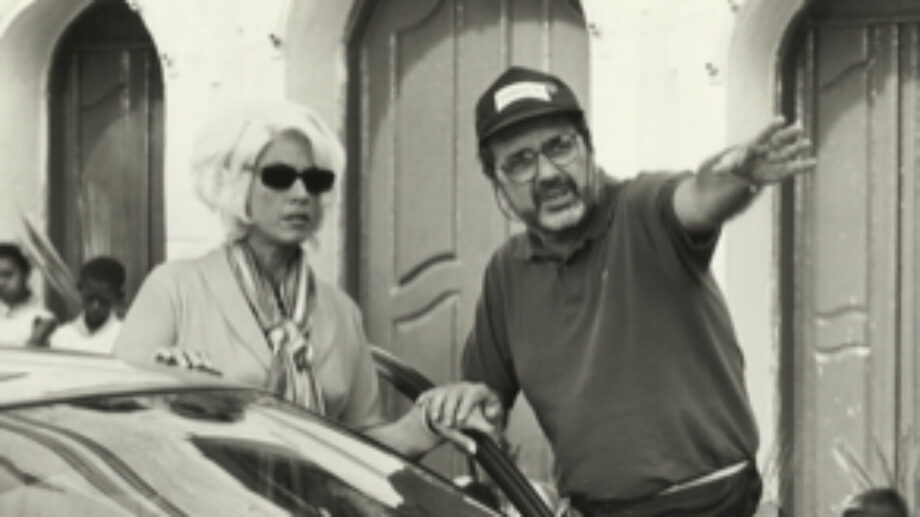
Carlos Diegues directing Toni Garrido in Orfeu
Although they may be the most notable, Orson Welles and Richard Peña aren’t the only aficionados of Brazilian cinema. In April, Film Society of Lincoln Center will send a love letter to Brazil through the work of one of its master filmmakers in “Brazilian Saga: Carlos Diegues’ Cinematic Adventures.”
A pioneer of Brazil's Cinema Novo movement, which brought social equality to the forefront, and an avid depicter of Afro-Brazilian life on the big screen, Diegues made his first feature Ganga Zumba in 1963. Twenty-one films and dozens of awards later, he continues to create bold, populist cinema that is celebrated the world over.
Like Carnival, sometimes referred to as a festa do povo (the feast of the people), Diegues's films belong to the masses that populate his screen. Brazilian anthropologist Roberto DaMatta famously said Carnival is where banditry takes place in the parlor. Diegues celebrates that very inversion in his Carnival film Orfeu (1999). Adapted from Vinicius de Moraes's play Orfeu da Conceição and considered by some to be a response to Black Orpheus (1959), Diegues' Orfeu subverts the Eurocentrism of the play and Marcus Camus's film by showing a more realistic version of favela life and the breakdown of Catholic idealism. It's love at first sight for celebrated samba school teacher Orfeu, who makes the sun rise with his music, and newcomer Eurídice. But things go horribly awry when jealousy and violence seep into the festivities. Diegues shows Carnival’s malleability through a large-scale look at the various samba schools and the tension between tradition and modernity, not to mention race and class.

Quilombo
Diegues tackles social issues throughout his filmography, but never more acutely than when addressing slavery and race. Set at a sugar cane mill in northeastern Brazil, Ganga Zumba (1963) tells the story of slaves conspiring to escape to Quilombo dos Palmares, a haven for fugitive black slaves. Twenty-one years later, Diegues returned to this story in Quilombo (1984), with renowned Brazilian actor Tony Tornado leading a similar slave revolt. In Joanna the Frenchwoman, starring French actress Jeanne Moreau, a rich sugar cane mill owner falls in love with brothel madam Joanna who find herself between an ethnic rock and a cultural hard place. Will she reciprocate her client's love?
Themes of love versus lust, rural versus urban, and poor versus rich permeate Diegues's work. All three fall into place in Bye Bye Brazil (1980) when a young musician picks up his accordion (and pregnant wife) to join the Caravana Rolidei, a group of vagabonds touring Brazil in a dilapidated truck. Lust draws the accordion player towards prostitute dancer Salomé, while television closes in on the vagabonds as they fight to perform in a technologically-advancing world.

Rio's Love Songs
After touring Brazil with the Caravana Rolidei, go with God in God is Brazilian as he searches the country for a suitable substitute to take over his duties while he takes a much-deserved vacation. Country meets city in The Big City (1966) when Luzia (Anecy Rocha) arrives in Rio de Janeiro to find her runaway fiancé, Jasão. Violence seeps through the cracks of Rio’s sidewalks as Luzia gets involved with the wrong man and uncovers Jasão's dark secrets.
Co-directed with Teresa Gonzales, Subway to the Stars (1987) follows Vinicius on an odyssey across Brazil as he searches for his girlfriend in this musically pulsing drama. Although music enhances a number of Diegues's films, nowhere is this more true than in Rio’s Love Songs (1995), which consists of four episodes inspired by four of Brazil’s greatest musicians: Jorge Ben Jor, Gilberto Gil, Caetano Veloso and Chico Buarque. The result is a spellbinding mix of music and image that's sure to make your heart dance.

Xica
Chosen as Brazil’s Academy Award submission for Best Foreign Language film in 1976, Xica (or Xica da Silva) recounts the true story of an African slave who rose to power in colonial Brazil through her relationship with influential diamond miner João Fernandes de Oliveira. Tieta (1995) stars Sonia Braga (Kiss of the Spider Woman, Dona Flor and Her Two Husbands) as a woman returning her hometown in Bahia 26 years after she was banished from it as a teenager.
Summer Showers (1978) follows the elderly Afonso's misadventures in retirement as his daughter, friends and neighbors quickly suck him into their drama, desires and travails. Diegues's most recent film, The Greatest Love Ever (2006), delves into the family secrets of a privileged astrophysicist, which are revealed when he is diagnosed with a fatal disease.
“Brazilian Saga: Carlos Diegues’ Cinematic Adventures” runs April 12 – 18 at the Film Society of Lincoln Center. Check out the press release for the full lineup, schedule, and more information.



